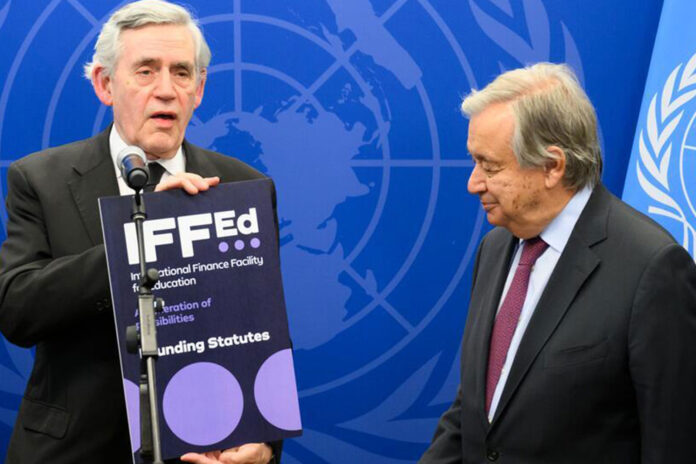
New York: In a significant move aimed at addressing the global education crisis faced by children in conflict zones, the United Nations has announced the launch of a $1.5 billion fund under the International Finance Facility for Education (IFFEd). The initiative was presented by UN Special Envoy for Global Education and former UK Prime Minister Gordon Brown during a special event on September 26, 2024. This fund is set to support millions of children, particularly in lower-middle-income countries (LMICs), who are facing disruptions to their education due to conflicts, climate disasters, and crises.
Gordon Brown stressed the urgency of the situation, with 500 million of the world’s most vulnerable children being affected by these disruptions. “As many as 260 million of these children will never go to school unless decisive action is taken,” Brown said, noting that more than 73 countries are currently dealing with conflict or climate-induced disasters that have hindered access to education.
The $1.5 billion facility, chaired by Sir Julian Smith, aims to mobilize resources from development banks, grants, and guarantees to provide educational opportunities to 20 eligible countries, starting with those in Asia. “This facility will allow us to do more by ensuring that for every $1 of paid-in guarantees in cash, we can deliver $27 in resources for education,” Brown explained. The initiative has already garnered the support of Sweden, the UK, and Canada and plans to partner with major philanthropic organizations and agencies like the Global Partnership for Education and Education Cannot Wait.
Education for refugees and conflict-affected areas
In his remarks, Brown highlighted the plight of refugees and displaced children, particularly those affected by war and conflict. “Hope dies when refugee boats capsize at sea. Hope dies when convoys can’t get through to besieged towns. But hope also dies when young people, denied education, cannot plan and prepare for their future,” he said.
Brown also underscored the growing crisis of education access in Gaza, where over 570,000 people, including a significant number of children, are facing severe disruption to their education due to ongoing conflict. “More than 2,000 children have lost limbs, and more than 20,000 have been orphaned,” he added, calling for an urgent response to address the educational needs of children under five, including early childhood development, nutrition, and caregiving support.
Focus on girls’ education and Afghanistan
A significant portion of Brown’s speech focused on girls’ education, particularly in regions like Afghanistan, where the Taliban’s return to power in 2021 has resulted in severe restrictions on the rights of women and girls. Brown revealed that the UN’s legal committee is set to meet in October 2024 to discuss labelling Afghanistan as a “gender apartheid nation”, citing the systemic suppression of women’s and girls rights, particularly in education.
If this declaration were to be made, it would signify one of the most substantial step the United Nations has taken in pushing back against the abhorrent policies of the Taliban since they captured Kabul in 2021.
Brown emphasized the need for global solidarity in confronting gender-based discrimination and urged countries to unite in their efforts to restore girls’ access to education.
In Afghanistan, the Taliban’s policies have resulted in the denial of education to thousands of girls, leading to what many human rights organizations have called a severe violation of basic human rights. Brown called on the international community to not only condemn these actions but to actively work toward ensuring that Afghan girls receive the education they deserve.
Four-point plan to address the crisis
Brown presented a four-point plan aimed at addressing the education crisis faced by children in conflict zones. The plan includes:
- Establishing the $1.5 billion IFFEd fund to provide educational resources to 20 countries across Asia, with plans to expand to Africa and other regions.
- Calling on countries to support the replenishment of the World Bank’s International Development Association (IDA), urging a $5 billion annual allocation to education from the $105 billion low-income countries fund over the next three years.
- Requesting humanitarian aid donors to allocate 10% of their contributions to ensuring that children in conflict zones continue to receive education.
- A special focus on the children of Gaza, many of whom have been killed, injured, or displaced due to the ongoing conflict. Brown called for immediate action to provide education, health, and nutritional support to these children.
The Asian Development Bank (ADB) has already been announced as IFFEd’s founding multilateral development bank partner. The first phase of IFFEd’s $1.5 billion initiative will target Asia and the Pacific, home to some of the world’s largest youth populations. Projects are expected to be approved by the end of 2024, with a gradual expansion planned into Africa and other regions.
The CEO of IFFed, Mr. Karthik Krishnan remarked after the event that “IFFEed is a funding mechanism that is giving people a viable path to achieve the $97 billion education funding gap we have across the globe.” Adding “Our goal is to have an impact on a billion plus people and put people on the path to education, employability and economic independence.”
This new education initiative announced by the United Nations represents a critical step in addressing the growing global education crisis. With millions of children displaced by conflict, climate disasters, and political instability, the IFFEd aims to provide long-term solutions and financial support to ensure that these children can access quality education. As Brown put it, “Education cannot be a victim of crises—it must be part of the solution.”
The international community, particularly donor nations and development banks, will play a crucial role in making this initiative a success. Through collective efforts, the United Nations hopes to not only restore education access but also provide hope and opportunities for the next generation of learners.









